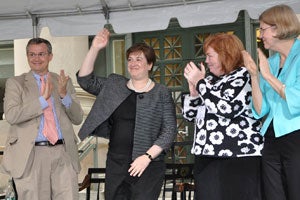In a Class Day address on June 3, U.S. Solicitor General Elena Kagan ’86 acknowledged that this year’s graduating class finds itself at an inflection point in society, facing great economic and political changes. But, she said, students should take advantage of these changing times because the greatest challenges often produce the biggest opportunities.
“Within all this difficulty there is incredible potential and promise. Yours is the task of finding that promise by remaking the world,” said Kagan, referencing a 1932 commencement address by Franklin Delano Roosevelt.
Kagan told the law degree candidates assembled on Holmes Field that young Harvard-trained lawyers are going to play “an absolutely pivotal role” in the task of rebuilding the world. “You will have the ability to participate in simply transformational work that will take full advantage of your abilities, and I hope you get the chance to do that,” she said.
Kagan, who was confirmed at the 44th solicitor general in March, shared her love for her new position and encouraged students to find work they love.
She shared a “three-part test” she considers when deciding whether a job is worth doing: Does the job challenge me intellectually? Do I feel as if I’m contributing something— do I feel as if I’m making a difference to someone outside myself? Can I just not wait to get to work in the morning? “By all of those standards, by this three-part test, my current job passes,” said Kagan.
And yet, Kagan said, she was so happy to return to Harvard Law School, where she was a professor, and dean of the law school from 2003 to 2009. “Not withstanding that I love my job now, there is not a day that goes by in which I don’t miss Harvard Law School. I miss the dynamism, and the energy that’s associated with this place. I miss the passion for ideas that one finds here and I miss the commitment to truly making a difference in the world,” she said.
Kagan was selected as class day speaker by the 2009 class marshals. In an April email to students announcing their selection, the marshals wrote: “As the first female dean of Harvard Law School, Elena Kagan demonstrated an extraordinary commitment to, and enthusiasm for, the enhancement of student life at HLS during her six-year term. We could not think of a more appropriate individual to address our class on this momentous day, as we each leave the Law School and embark on our own careers.”
During Class Day ceremonies, Class Marshal Megha Hemant Parekh ’09 introduced Kagan, saying, “Though she has a wealth of accomplishments, we students know her best, and appreciate her most for her work as Dean Kagan.”
Kagan, the Charles Hamilton Houston Professor of Law, is on leave from the faculty during her service as solicitor general. She first came to Harvard Law School as a visiting professor in 1999 and became professor of law in 2001. She has taught administrative law, constitutional law, civil procedure, and seminars on issues involving the separation of powers. She was appointed dean of the law school in 2003.
From 1995 to 1999, Kagan served in the White House, first as associate counsel to the president (1995-96) and then as deputy assistant to the president for domestic policy, and deputy director of the Domestic Policy Council (1997-99). In those positions she played a key role in the executive branch’s formulation, advocacy, and implementation of law and policy in areas ranging from education to crime to public health.
Kagan graduated from Princeton University in 1981. She earned a master’s in philosophy from Oxford and graduated from Harvard Law School in 1986. Kagan clerked for Abner Mikva of the U.S. Court of Appeals for D.C. Circuit and then for the late Supreme Court Justice Thurgood Marshall. She later practiced law as an associate at Williams & Connolly, and taught law on the faculty of the University of Chicago Law School.
During her five-year deanship, Harvard Law School has experienced remarkable growth and change, including a headline-making reform of the curriculum, an impressive expansion of the faculty, a major initiative to support public service, and the design of a new building complex now under construction.
